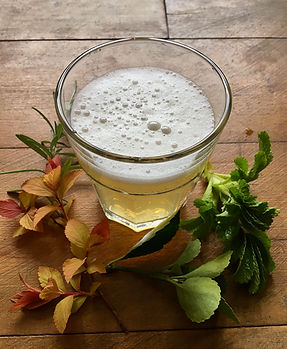
April 2022
Branches everywhere
You can learn more in a pub than ever you can at university, reckons Alastair Gilmour.
In the pub every Sunday, same time, same corner, sit The Twig Men. There are generally five or six of them and are rarely seen individually, but they assemble at one o’clock on the dot to drink their lunchtime beer. And discuss sticks.
To be slightly more accurate, each one brings in a branch or a leaf or sometimes a small insect in a jar, places them proudly among the pints, then sits back and invites the others to take a stab at their provenance. It’s an Antiques Roadshow for arboriculturists and a light-hearted query for Gardeners’ Question Time, lubricated by ale.

“Hornbeam,” says one. “Nah, hornbeam has a smooth, grey bark – that’s more of an elm... get mine while you’re up and one for Arthur... look, just there, that’s where you can tell elm from hornbeam. Now, as for oak...”
To eavesdrop on this sort of pub conversation is more than a source of amusement, it’s an education and actually a privilege. The Twig Men talk about serrated leaves and bifurcating boughs in the same earnest manner as the rest of us reserve for Mo Salah’s goalscoring or Will Smith at the Oscars.
God forbid that anybody tells them there’s a phone app for identifying plants – this is pub culture at its leafiest best. The Twig Men and their ilk are what puts the ‘great’ into the Great British Pub.
The pub is a social leveller, a library of rich conversation and a haven to treat as your own only to leave the tidying-up to someone else. The pub could be a single room with fading photographs and a set of antlers on the wall, a post-modernist watering hole that looks like it’s been around forever but was a building society until last month, a rural outpost with a labrador snoozing under a bench, or a stainless-steel cosmopolitan, multi-screened meeting place – the pub you frequent reflects your own attitude and impacts your comfort zone.
Our Twig Men are simply enjoying their version of what has gone on in the pub since the first swinging sign creaked its way into the human psyche two thousand years ago.
In the late 1930s a ‘mass observation study’ identified the main topics of pub conversation as sport, betting, work, people, drinking, politics and ‘dirt’. Not much has changed. The pub turns a ‘normal’ person into a professional commentator, an amateur detective, or sex therapist. Look around the room at your fellow pub-folk. They’re earwigging on groups like The Twig Men and smiling into their pints at their eccentricity – forgetting, of course, that their own little foibles are visible for all to dissect.
For example, the local art history evening class must have just finished when I walked in on this gem at the bar (I think I caught it correctly): “And a pint of Bombardier, please. Any toasties today? Sorry yes… Picasso’s bronze Glass of Absinthe is a particularly good example of his obsession with deconstruction and an indication of his bohemian lifestyle and that of his contemporaries. The existentialist view on the other hand... thanks, cheese and onion will do... is to put the stress on concrete existence and consequently on subjectivity and individual freedom... ooh, it’s hot... and insofar as one approaches moral perfection... and one for yourself...”Best of all, anybody can join in – on any rung of the culture ladder, too. It’s a pub, that’s what they’re for. You can put across your own point without feeling intimidated because nobody next day will remember to what height the conversation soared or how far down the moral scale it plunged. In the lifetime of a pint, you can learn the function of the alimentary canal, have the difference between 100-30 and 5-2 explained in minute detail and discover the secret of great coq au vin (reducing the sauce by a third, apparently).
"In the lifetime of a pint you can learn the function of the alimentary canal, have the difference between 100-30 and 5-2 explained in minute detail and discover the secret of great coq au vin"
The person next to you may be a doctor, a council gardener, a politician, a pilot or an electrician explaining ‘snagging’, but a random collection of adults in a bar sipping ale evens out every step in the social staircase.
At one country village pub I’ve been known to frequent, the conversation is usually dominated by farming activities, the weather forecast or the hotly-contested annual leek show (earnest mentions of rust, flags and neck rot ensure 12-month reportage). Regulars have nicknames like our Twig Men and are also referred to by their occupations or habits – The Byreman or Lawnmower Salesman, for instance – while someone invariably pops his head round the bar and asks: “Brown Ale Man been in?”.
Bifurcating biologists, art historians and horseracing statisticians allow you to leave the pub on a high, smugly nursing a heightened level of knowledge; spiritually enlightened, even. But beware the consequences. Have too much to drink and you’re liable to go home with a pocketful of vegetation – or a new lawnmower.
